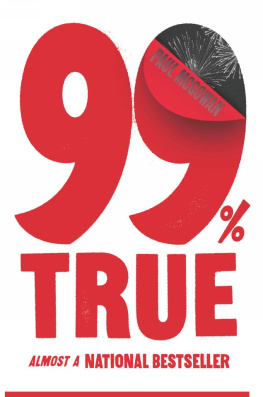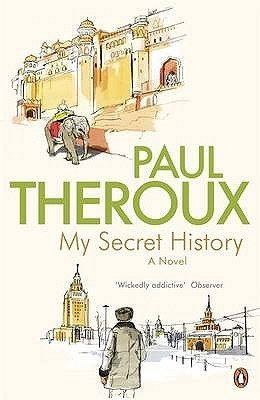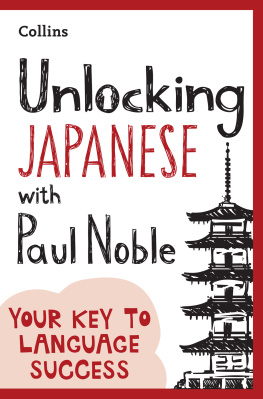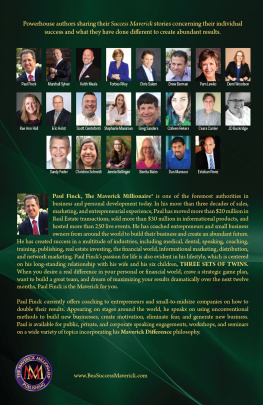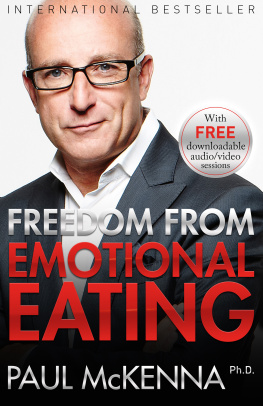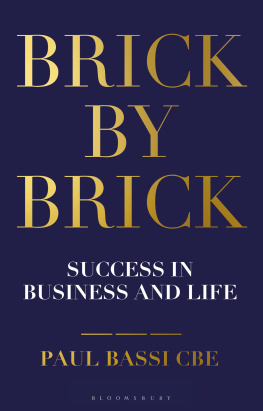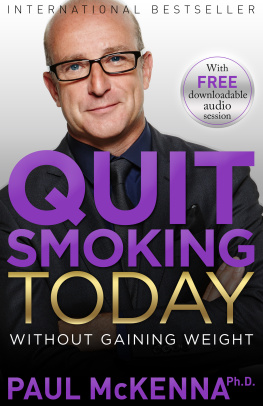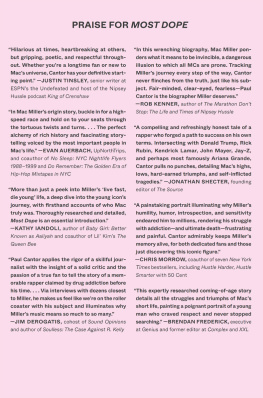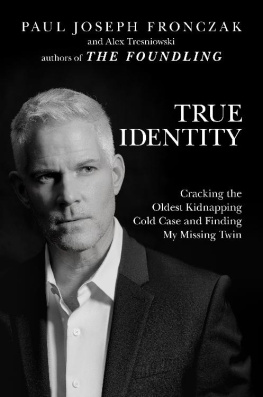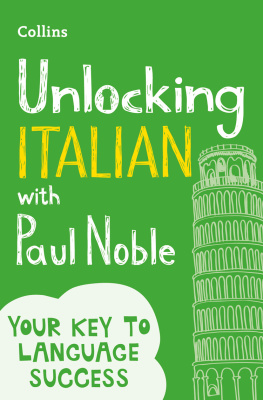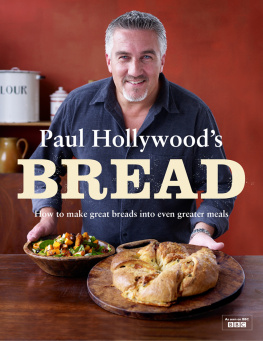
99% True
by Paul McGowan
Copyright 2019 by Paul McGowan
All rights reserved.
No part of this book may be reproduced or transmitted in any form, or by any means, electronic or mechanical, including photocopying, recording, or by any information storage and retrieval system.
Visit: https://www.paulmcgowan.com
ISBN
978-1-7335833-0-5 Hardback
978-1-7335833-1-2 Paperback
978-1-7335833-3-6 Ebook
978-1-7335833-2-9 Audiobook

Paul McGowan is the real deal, 100% inspired, inspiring and a genuine mensch. This book will make you laugh and push you to do something remarkable. Go make a ruckus.
S eth G odin
A uthor , This Is Marketing
Paul McGowan tells all (and then some) in this riotous tale of misbegotten success thats 99% true in all the best ways. From his not-so-innocent youth growing up in the shadow of Disneyland and summer evenings in the innocent 1950s, to his dope-smoking, snake-eating, draft-dodging, loony-bin misadventure through Europe, to his struggles to build a thriving enterprise from a stack of dusty albumssee how the CEO of a worldwide company took fifty years to become an overnight success.
Unlike Paul, you may never get picked up by the Secret Service or carry the shame of bankruptcy, but you just might see yourself in his repeated failures or in his refusal to let life keep him down. Youll laugh and youll cry as Paul describes the struggle of finding his place in a community you never knew existed. Through it all, youll discover what Paul did: lifes detours offer the best opportunities to find your way.
For Terri
CONTENTS
Chapter 1
I have been through some terrible things in my life, some of which actually happened.Mark Twain
M y family moved to Anaheim because my father heard it was the promised landa new beginning in an affordable and up-and-coming rural suburb of Los Angeles, carved out of acres of sweet orange, walnut, and avocado groves. Sure, car exhaust mingled with the citrus blooms and orchard dust, but it was the gold rush days of the early 1950s: jobs were plentiful, land and homes were new and cheap, and outsiders were welcomed with open arms. Even better, Disneyland had opened just three years before the McGowan clan arrived. Along with my sisters, Sharane and Bobbi, I spent many nights camped out on the front lawn, watching the nightly fireworks displays explode in bristling starbursts of gold, yellow, and red.
It was 1958, and the warm evening air of Southern California was intoxicating. Our development of tract homesthen a new trendwasnt quite as impressive as the Magic Kingdom, but it was orderly and symmetrical. It was named Gibraltar: a nine-street square carved out of a small patch of the orange groves that surrounded us like green-capped sentinels. Where the orchards borders ended, our neighborhood streets began. Those orchards and groves, along with the acres of strawberries, the multiple fruit stands, and the occasional egg and dairy farms, offered endless adventure for me and my fellow neighborhood ruffians.
With school out for the summer, I was on my own as soon as the front door closed behind me. My parents, Don and Sue, didnt give a second thought to leaving a ten-year-old boy on his own without plans, guidance, or instructions other than a stern dont get in trouble. In fact, once out that door I rarely returned home until dinnertime or dark, depending on what kind of trouble we were actually causing. And there was certainly plenty of that. I had the devil in me back then, and shudder to remember some of the stunts we pulled.
On Saturdays I would get up early and ride my bike south on State College to Chapman Avenue, then take a tough uphill climb through the city of Orange with its traffic circle, and finally reach Irvine Park, about 12 miles from my house, by noon. In those days bikes had no gears, heads had no helmets, and cyclists took their chances with traffic. My typical attire was a T-shirt, shorts, and PF Flyers: black canvas high-top sneakers with white rubber soles and white cotton laces, finished off with a round PF on the side. In Irvine Park I would meet with school buddies from Placentia and Yorba Linda, to see what kind of mischief we could manage to assuage the summer doldrums. On an average weekend wed at least roll trashcans into the small laketheir tops would fly off, leaving a swath of half-eaten chicken, brown beer bottles, crumpled napkins, and empty bean cans with their jagged metal lids still attached. Other weekend projects to battle boredom entailed letting the air out of the park rangers truck tires, hiding behind boulders to scare the crap out of unsuspecting hikers near Rooster Rock, skidding our bikes along dirt trails sternly marked no bikes, or craftier misdemeanors like my first scrape with the law, one that should have landed me in jail.
It all started innocently enough on a lazy Saturday afternoon. My new best friend, David Wileya dark-haired, athletic, alpha-male transplant from Dallashelped me prepare the bait: overalls stuffed with newspaper, a hoodie sweatshirt with a basketball for a head, and Dads old boots pinned to the pant cuffs. We hoisted the body out of the garage and dragged it to the edge of the orange grove nearest my house, its lifeless head bouncing along La Palma Ave as twilight approached. The street was empty, so we threw the dummy face-down onto the road and hid amongst the trees, preparing an arsenal of rotting oranges scooped off the fertile ground. Night sounds surrounded us as we tensed in the shadows. Suddenly, the highway turned to daylight. With a loud boomp boomp, a car mangled the torso and screeched to a halt. The body, now crumpled on the asphalt, was lit red by taillights. The car roared away.
Shit! said David. Hit and run!
Hang on! I said. Here comes another.
The body, twisted on the highway, was again brightly lit as a car swerved to miss it. Doors were flung open. Soon, gasps of horror turned to cries of panic under a hail of oranges, as we pelted the driver and passengers with our stores of orange ammunition.
What the hell? cried the driver, shielding his head as he knelt next to the body. Dammit, this is a dummy!
Without warning, the sound of a third vehicle paused our barrage of oranges. Tires screeched, doors opened, and bright lights again moved toward the lifeless lump on the road as we prepared our next round of missiles. Suddenly, the world flashed bright red and blue.
Its the cops! cried David.
Run! I yelled, not daring to look back. Halfway into the orange grove the flashlights started gaining on me, so I hurtled Old Man Niedermeyers fence and hid in his cactus garden, braving the poking spines. The cops bright lights played over the orange trees as red and blue washed the grove. I held my breath and exhaled only after they left. David and I would live to see another Saturday.
School wasnt far away. After barely graduating from sixth grade at McFadden Elementary in Placentia, a mostly Hispanic village three miles northeast of Gibraltar, I wound up in Placentias Kramer Middle School, where I struggled through seventh and eighth grades. I hated school, and I didnt feel any better about it when my parents threatened to send me to Catholic school if I didnt graduate. I didnt take the threat all that seriouslywe werent Catholic, and anyway we couldnt afford private school. But the threat of those mysterious Catholics was ample motivation to scrape by with just Cs and Ds.
I was a goofy-looking kid. It was bad enough that my parents demanded a fresh crewcut every two weeks when my peers were experimenting with grooming; worse was a prominent set of buck teeth that Id earned by sucking my thumb well into kindergarten. My upper lip couldnt cover my jutting teeth when my mouth was closed, and they didnt begin to straighten out until seventh grade, when orthodontists filled my mouth with painful silver wires and bands, loudly advertised by a metal hoop attached to a flesh-colored elastic headband. Despite all that hardware, I tried to dress like the in crowdbut our family lacked the money to buy stylish clothes. It was the end of the postwar economy, and a decade and a half into the Cold War. The nation was on a growth curve that had yet to trickle down to the up-and-coming middle class. When those soft, checkered Pendleton shirts were all the rage, my mother did her best to make me some by hand, but her generosity backfired: the clothing snobs at my school rolled back the collar of my homemade shirt to expose the lack of an authentic label, then ridiculed me for being too poor to buy real clothes.
Next page
